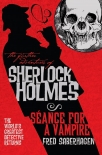The Dracula Tape by Fred Saberhagen (best black authors TXT) 📗

- Author: Fred Saberhagen
Book online «The Dracula Tape by Fred Saberhagen (best black authors TXT) 📗». Author Fred Saberhagen
I signed what seemed innumerable papers, which were then wrapped for posting back to Hawkins. My gypsies, Szgany as I called them then, were at the castle frequently, and through both fear and loyalty they were, in what touched my own person, most dependable. They carried mail for me, as well as bringing me horses and caring for them. They brought me food sometimes — I will discourse of my eating habits later — and formed for a long time a useful although shaky bridge twixt me and other men.
When we were done with signing and mailing Harker read to me his notes describing my new estate and how he had located it. I remember the description well, as I remember the rest of my enemies’ journals for that year. I am not likely to forget a word.
“At Purfleet, on a by-road, I came across just such a place as seemed to be required, and where was displayed a dilapidated notice that the place was for sale. It is surrounded by a high wall, of ancient structure, built of heavy stones, and has not been repaired for a large number of years. The closed gates are of heavy old oak and iron, all eaten with rust.”
“The estate is called Carfax, no doubt a corruption of the old Quatre Face, as the house is four-sided, agreeing with the cardinal points of the compass. It contains in all some twenty acres, quite surrounded by the stone wall above mentioned. There are many trees on it, which make it in places gloomy, and there is a deep, dark-looking pond or small lake, evidently fed by some springs, as the water is clear and flows away in a fair-sized stream. The house is very large and of all periods back, I should say, to medieval times, for one part is of stone immensely thick, with only a few windows high up and heavily barred with iron. It looks like part of a keep, and is close to an old chapel or church. I could not enter it, as I had not the key of the door leading to it from the house, but I have taken with my Kodak views of it from various points. There are but few houses close at hand, one being a very large house only recently added to and formed into a private lunatic asylum. It is not, however, visible from the grounds.” This last was not an accurate statement, as I later discovered; but of course I was ready to make a few allowances for salesmen’s puffery.
“I am glad that it is old and big,” I said when he had finished his description. “I myself am of an old family, and to live in a new house would kill me. A house cannot be made habitable in a day; and, after all, how few days go to make up a century. I rejoice also that there is a chapel of old times … I am no longer young and my heart, through weary years of mourning over the dead, is not attuned to mirth … I love the shade and the shadow, and would be alone with my thoughts when I may.”
We spent a long evening, similar to the last; and this, the night of May seventh to eighth, 1891, was the last for a long time, many months, when either of us felt that things were going well, indeed, when we were not pondering each other as enemies, at least in potential.
I had naturally taken the precaution of removing all mirrors from the rooms of the castle that I expected my guest to occupy or visit. On the third morning of Harker’s stay, however, I entered his room early in the hours of daylight — an uncomfortable time for me — to find him shaving with the aid of his traveling mirror.
It had been a conceit of mine that when I began to be fully and unquestioningly accepted in the normal world as human, the psychology of most men and women would not permit them to credit the objective fact that I cast no reflection in a mirror, at least none ordinarily perceptible to the human eye. Let me say here parenthetically that film and the cathode ray tube are something else again. But whatever the outcome of research along this line is to be, on that morning I had deluded myself into thinking that this reasonable, unsuperstitious Englishman would not be allowed by his own psychology to perceive the exact truth: that when I entered the room behind him as he shaved, my figure cast no reflection in the glass.
I was wrong. When I said, “Good morning!” almost in his ear, he was so startled that he reacted physically and his straight razor made a slight cut on his chin. At the same time I was made aware that he had indeed noted my image’s absence from the mirror, for he alternated his glance from me to it not once but several times whilst he struggled not to let his bafflement show on his face. This was a blow to me, the first indication that my plans were indeed impossible, and it hit me hard, though I struggled to maintain composure.
After a moment Harker gave up looking for me in his glass, returned my greeting in a flustered way, then put his razor down and began to look for some





Comments (0)